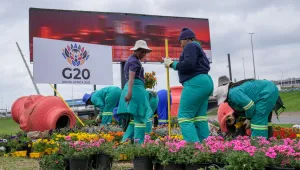A NEW SURGE of manufactured exports from China and India is threatening prosperity in Africa. It is also undermining many of the efforts by American and European donors to alleviate poverty. China's own great leap forward may well doom Africa.
Washington's Millennium Challenge Account, with targeted governance assistance to better-performing countries, and London's new initiative to relieve poor African countries of crushing debt burdens are helping alleviate the poverty trap that embraces so many sub-Saharan economies. But both fail to counter the impact of Chinese success.
No matter how much Europe, the United States, and Japan may do for Africa, trade is always more forceful than aid. The inflow of Chinese commerce has helped to slow, if not destroy, the outflow from Africa of manufactures, especially low-cost textiles and simple garments.
In relatively well-off South Africa, 86 percent of all clothing imported comes from China. It supplies 60 percent of all towels, blankets, and curtains imported into South Africa. Given these figures, it is easy to understand why 300,000 textile workers have lost their jobs since 2002, with more to follow. South Africa already has a steady unemployment rate of at least 40 percent. Jobs are growing at only 3 percent a year, half of the rate needed to absorb new job seekers.
South Africa also has relatively high labor costs. In the local textile industry, average basic salaries have increased from the equivalent of $215 a month to $500 a month. In China, India and Malaysia, textile firms pay their workers more on the order of $40 to $100 a month.
Consider Lesotho, a poor mountainous enclave of 1 million people surrounded by South Africa. It developed a thriving textile industry in 2000 based on the passage of the US African Growth and Opportunity Act, which for the first time gave a number of African nations preferential entry into the US market for their textiles.
Investors, especially from Taiwan, China, Mauritius, and Malaysia, built factories in Lesotho and by 2002 produced nearly a third of all textiles exported to the United States under the act. The investors employed 50,000 local Lesotho citizens, mostly women. About $400 million entered the economy of Lesotho annually. More so, textile manufacturing provided work where none had existed.
This bonanza is ending. In the last six months of 2004, eight Lesotho factories closed, leaving more than 12,000 workers without jobs. Seventeen more factories closed last month, throwing another 11,000 people out of work.
China did nothing directly to impoverish Lesotho. Instead, in one of the unwitting cruel ironies of free trade, the factories in Lesotho have closed because of the long-planned expiration last month after 30 years of the World Trade Organization's Multi-Fiber Agreement. Originally developed to protect the textile industries of developed nations against competition from low-cost producers in foreign states, the end of the agreement means that China and India will henceforth dominate at least 80 percent of the global market in textiles and apparel, driving out other not-quite-so-low-cost producers.
The expiration of the agreement means that as many as 27 million textile workers will gradually lose their jobs outside of China and India, and perhaps Bangladesh.
Many South Africans and other Africans argue for "protection" against China, or at least some reconsideration of the terms of trade that once again hinder African opportunity.
But open trading actually promotes growth, and the least protected African markets and countries have always thrived despite short-term problems and immediate adverse consequences.
Clearly Africa, especially South Africa, needs help going upmarket in terms of its manufactures. Possibly even Lesotho and other small countries can find acceptable export niches. The United States and other nations can help level the playing fields of international commerce by relieving debt and assisting in those economic areas where African nations have comparative advantages often the development of appropriate ecotourism facilities. But it also means severely reducing subsidies to their own farmers. If the European Union and the United States limit subsidies to cotton and peanut growers, for example, African countries like Burkino Faso and Senegal can compete. So might the sugar growers of southern Africa compete more favorably if US subsidies are reduced and quotas for incoming exports expanded.
Improving the economic potential of Africa depends less on countering the Chinese threat directly than on enhancing the ability of Africa's farmers and workers to become healthier and more productive. Poverty is reduced by jobs, not handouts.
Robert I. Rotberg is director of the Kennedy School's Belfer Center Program on Intrastate Conflict and Conflict Resolution and president of the World Peace Foundation.
Rotberg, Robert. “Asian Exports Crimp Africa's Rise.” The Boston Globe, February 15, 2005





